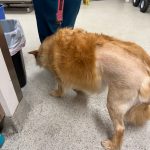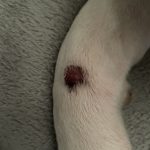Hello,
If you are confident with the diagnosis of a cranial cruciate ligament injury then I do believe that a TPLO is the best way to treat this. As far as your choice of surgeon you can certainly ask your vet or a trusted member of your community for advice.
Hi Krista,
I discovered your YouTube videos yesterday and found your advice on cat care incredibly helpful. My wife and I are caring for our 18-year-old Birman cat, who is in stage 4 kidney disease with significant muscle loss. She’s also struggling with constipation and has other health issues, including high blood pressure and a heart murmur.
Currently, we’re feeding her a mix of wet food (chicken broth, chicken, pumpkin, and egg yolk), and providing SubCut fluids (50ml/day), along with the following supplements:
– Epakitin (0.5g/day)
– Pet-Tinic (2ml/day)
– Lactulose (3ml/day)
– Phos-Bind (0.2g/day)
– Potassium chloride (0.19g/day mixed in the broth – though we’re concerned she’s not getting the full amount since she’s unable to finish the broth).
– In addition, she’s on Amlodipine (0.25ml/day) to manage her high blood pressure.
Despite this, her weight has decreased significantly over the past year. She was once 3.3kg, but a year ago dropped to 2.5kg, and three weeks ago, it dropped again to 1.8kg, despite our best efforts to feed her.
A week ago, we had an enema done at the vet, which relieved some diarrhea, but there was still hardened stool near her anus. We’ve been massaging her abdomen and anus daily to stimulate defecation, and were able to help her pass a large, hard stool last Wednesday. Since then, she’s only passed small amounts of stool – mostly liquid or dark – and has had a lot of difficulty.
Today, we used a Pedia-Lax suppository (1ml), and after about 30 minutes, she passed a larger stool with dark liquid diarrhea. The stool was slightly hard, dark, and very smelly. She’s now very exhausted and resting, but did purr a bit before falling asleep.
For hydration, I gave her 10ml of SubCut fluids before the suppository to prevent dehydration. We’ve seen three different vets, but none have been able to provide lasting relief.
We’re reaching out for advice on whether we’re on the right track and if there’s anything else we can do to help her feel better and poop more easily. Any suggestions, given the circumstances, would be greatly appreciated.
Thank you so much for your time and any guidance you can offer.
Warm regards,
Joel and Sonia
Comments
I was wondering if the Tibial plateau leveling osteotomy is a good treatment for a very active female Akita-husky mix, approximately 2.5 years old? Tater has been spayed, and didn’t react to that procedure well. She “guarded” her abdomen and haunches for over a year. We have moved, so have access to a different vet. Her primary vet office is Price’s Creek (Ohio), who referred her to Medvet for the surgery. I can’t remember the vet who we had Tater’s consultation with at Medvet.
Comments
I have a very special and painful case I need help with, I have tried several different veterinarians with no diagnosis or prognosis so far. It may be a long shot, but I was hoping you could help me shine a light on this.
In April I found an extremely skinny stray cat and took him in. I first thought he was malnourished from lack of food for being in the streets, but 4 months in his case keeps unfolding.
He is likely older than 15 years old, but he’s a happy cat with a lot of energy and mobility. He weighs 3kg but he’s a big cat, you can feel every single bone in his spine, although you can’t see them that easily because he has long hair. He’s completely affectionate, loves to be pet, and asks very politely for attention and food all the time.
All we know about his past is he is neutered, he had some teeth surgically removed and he tested negative for FIV and FeLV.
He had a huge appetite when I first took him in, he would eat 100g of food in one meal and ask for more right after. He would sometimes ‘cough’, it sounded like he was choking on some kind of fluid, it doesn’t happen in sequences, but it happens almost every day until today.
He always drank LOTS of water and produced a lot of urine as well. His feces at the beginning were really solid with some mucus.
After a month, he continued to eat plenty and hadn’t gained any weight, that’s when he started to throw up. It started happening a few days a week, usually after spending several hours without eating he would throw up a clear frothy fluid with no content, and then it progressed to twice every day regardless of when he had eaten.
We suspected it could be diabetes or hyperthyroidism, but the labwork didn’t confirm either, it showed regular kidney function with small liver function alterations.
We then introduced prednisolone (2,5mg/day) and changed his diet from a mix of natural home-cooked protein, hypercaloric wet food, protein supplements, and dry food to exclusively Royal Canin Hypoallergenic while waiting for Royal Canin Gastrointestinal Hydrolyzed Protein to arrive in Brazil, keeping Omega 3 (fish oil) 500mg/a day in his diet.
Vomits went away for a while. He kept drinking lots of water and peeing a lot, but his feces got softer (not liquid).
He had periods where he lost his appetite, which we treated with mirtazapine, he reacted after 6 days.
We performed an ultrasound and discovered that basically all his internal organs were compromised. He has severe alterations everywhere. Still, the best specialists I could find couldn’t tell me what was causing it and offer a course of treatment that didn’t involve opening him up to collect tissues for a biopsy.
I personally think it is absurd that a doctor could look at this frail elderly cat who obviously can’t resist anesthesia without serious risks and say that surgery is the only way to go, all to find out for sure if we’re dealing with a lymphoma or an infection. I’m looking for someone to advise me on the most effective course of action. Of course, I aim to reverse his condition, but I understand that given his age and how advanced it is, it might not be an option.
He is currently at 3kg, eating exclusively Royal Canin Gastrointestinal Hydrolyzed Protein with fish oil, and taking prednisolone every day for a month now. His appetite is healthy, he still drinks a lot, pees a lot, and poops regularly but softer. He eats an average of 5 small meals.
Vomits are back down to a few times a week, usually early in the morning before his first meal, and always a clear liquid. He goes and eats right after throwing up so I get the impression he is not nauseous.
He doesn’t seem to be in pain overall.
He’s not gaining any weight regardless of all my efforts.
That is why I’m giving this a shot and trying to get your attention. I hope you have more resources and knowledge that could help me figure out appropriate next steps to give this little guy the best fighting chances I can.
On this link you’ll find a translation of his bloodwork and ultrasound. I had chat GPT translate it for me so forgive me if there are errors.
Link: https://docs.google.com/document/d/1yqcen-TYzyvfBYU-J4t1tCHola1E2otDGDa1H7V032Y
I appreciate any support you can lend me, his name is Valentim which means brave and strong, and I want him to win this fight.
Comments
I have a 6 year old, female Doberman mix (we rescued her and not sure her exact breed-she is smaller than most Doberman-she is around 44 lbs. About a month ago, she started having accidents in the house, constant urination, and dribbling stream when she actually pees. I thought she probably had a UTI and took her to the vet. They assumed as well she probably had a UTI and gave me a prescription. After ten days on prescription, no change. I went back to vet and told her there had been no change. They started her on Proin. She has been taking this for about 2.5 weeks and there has been no change. When I take her out , she pees about 4 times in a dribble.
They have done blood tests, urinalysis, and x ray. Even after using bathroom twice, her bladder still had urine in it. They are going to send it to a specialist, but we are already about $800 in and no answers. I feel so bad for my girl, because she is embarrassed when she has an accident inside. Any help would be great!
Comments
My dog is predisposed to have reactions to ingredients in every heartworm medication. I have received no definitive answer from my vet as to what to do except to basically play Russian Roulette which I’m not really willing to do. I would like to know if you have any advice on how to herbally treat heartworm without using conventional treatment. He is a husky, German Shepherd, wolf mix he has been DNA tested and he is 20 months old. Any information that you could provide would be helpful. My name is James Dalton and if you need to contact me my number is 864-906-4305. Thank you
Comments
My 18 month old pit bull American bulldog mix , has a spot on his upper paw that’s raised. He licks the spot sometimes. Should I be concerned ?

















Hello,
I’m sorry to hear about your cat.
I think that the question is how to help manage the constipation? I think that the weight loss and progression of the kidney disease is Kelly part of the problem. Have you checked her thyroid function? I typically see these older cats having this disease develop with the others your cat has. This disease also causes muscle loss. But this one has an available treatment option.
I think that you should recheck your blood work and see if’s his might be part of the reason for the constipation.
Also try to encourage play and exercise. It will help her fell better and eat better and also help the internal muscles that assist the colon and avoid constipation.